- News
- Reviews
- Bikes
- Components
- Bar tape & grips
- Bottom brackets
- Brake & gear cables
- Brake & STI levers
- Brake pads & spares
- Brakes
- Cassettes & freewheels
- Chains
- Chainsets & chainrings
- Derailleurs - front
- Derailleurs - rear
- Forks
- Gear levers & shifters
- Groupsets
- Handlebars & extensions
- Headsets
- Hubs
- Inner tubes
- Pedals
- Quick releases & skewers
- Saddles
- Seatposts
- Stems
- Wheels
- Tyres
- Tubeless valves
- Accessories
- Accessories - misc
- Computer mounts
- Bags
- Bar ends
- Bike bags & cases
- Bottle cages
- Bottles
- Cameras
- Car racks
- Child seats
- Computers
- Glasses
- GPS units
- Helmets
- Lights - front
- Lights - rear
- Lights - sets
- Locks
- Mirrors
- Mudguards
- Racks
- Pumps & CO2 inflators
- Puncture kits
- Reflectives
- Smart watches
- Stands and racks
- Trailers
- Clothing
- Health, fitness and nutrition
- Tools and workshop
- Miscellaneous
- Buyers Guides
- Features
- Forum
- Recommends
- Podcast
review
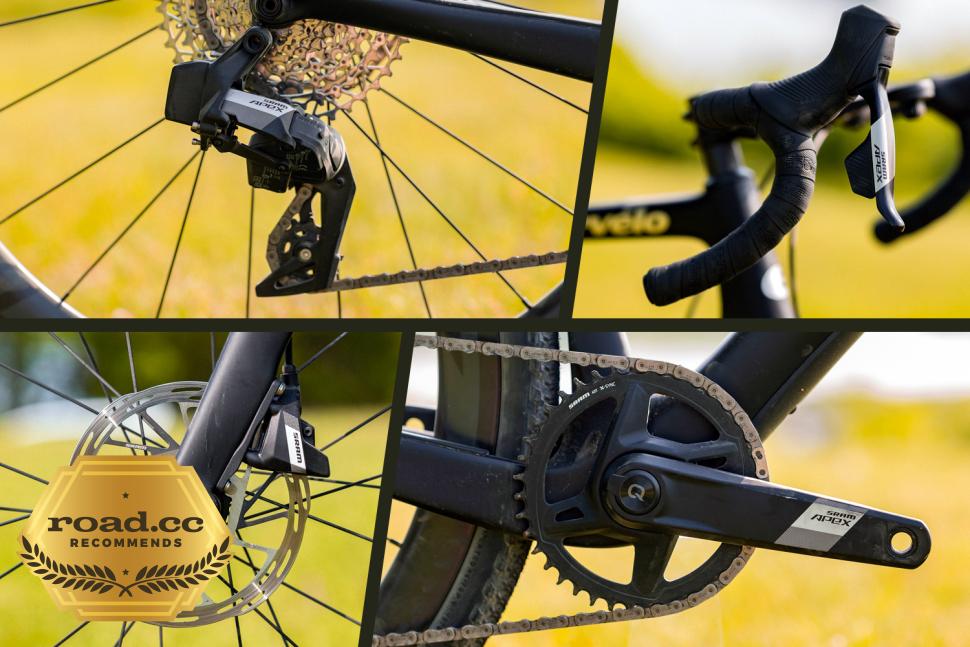 2024 SRAM Apex XPLR AXS - 2.jpg
2024 SRAM Apex XPLR AXS - 2.jpg£1,262.00
VERDICT:
Affordable and refined electronic groupset for the people
Accurate shifting
Great price
Pleasing aesthetics
Powerful braking
Relatively light
Available in 1x configuration only
Weight:
2,890g
Contact:

This product has been selected to feature in road.cc recommends. That means it's not just scored well, but we think it stands out as special. Go to road.cc recommends
At road.cc every product is thoroughly tested for as long as it takes to get a proper insight into how well it works. Our reviewers are experienced cyclists that we trust to be objective. While we strive to ensure that opinions expressed are backed up by facts, reviews are by their nature an informed opinion, not a definitive verdict. We don't intentionally try to break anything (except locks) but we do try to look for weak points in any design. The overall score is not just an average of the other scores: it reflects both a product's function and value – with value determined by how a product compares with items of similar spec, quality, and price.
What the road.cc scores meanGood scores are more common than bad, because fortunately good products are more common than bad.
- Exceptional
- Excellent
- Very Good
- Good
- Quite good
- Average
- Not so good
- Poor
- Bad
- Appalling
SRAM Apex XPLR AXS, using technological cues from the company's more premium groupset offerings, represents eight years' worth of research and development ushering in electronic shifting to the entry-level end of the market. Despite being the fourth-tier groupset in SRAM's lineup, Apex XPLR AXS offers refinement, durability and performance levels of its more premium siblings. As it stands, there's nothing currently available that can match it on overall value; it's the best entry-level electronic groupset on the market. Okay, let's qualify that a little – it's the best 1x entry level electronic groupset available.
> Buy now: SRAM Apex XPLR AXS derailleur for £218.99 from Tredz
> Buy now: SRAM Apex XPLR Cassette for £135 from Sigma Sports
> Buy now: SRAM Apex AXS Front Brake/Right Shift Lever for £179.99 from Tredz
> Buy now: SRAM Apex AXS Rear Brake/Left Shift Lever for £179.99 from Tredz
> Buy now: SRAM Apex D1 12-Speed Chain for £35 from Sigma Sports
> Buy now: SRAM Apex D1 DUB Wide Chainset (40T) for £108.99 from Tredz
> Buy now: SRAM Paceline Rotors from £38.99 from Tredz
> Buy now: SRAM eTap battery for £44.49 from Tredz
The American-based company has done well to ensure Apex XPLR AXS uses the same visual treatment as its pricier siblings – I'm talking SRAM Rival here. The result is a Rival-esque aesthetic that provides a level of refinement you'd expect from its £438-more-expensive sibling. The sophisticated visual treatment will appeal to both new and experienced riders alike, and even possibly persuade some diehard mechanical purists to upgrade to electronic shifting on their gravel bikes, too.
The only real difference between Apex and Rival is the material in the derailleur cage, pulley wheel bearings, paint finish and overall aesthetic, which help boost the groupset's perceived quality. There's also an NX-level Apex flat-top chain that ditches a nickel-chrome coating for a standard polished finish.
The controls employ the same slimline hood shape and ergonomics of Rival. Closer examination will reveal a stamped brake lever as opposed to the forged unit used on Rival, but this is purely a cosmetic disparity and does not affect performance.
Specifications
The Apex AXS range is available in two configurations – Eagle or XPLR. They share the same Apex 1 Wide crankset and drop-bar control layout, but which one you choose will come down to the riding and terrain you most prefer. The Apex XPLR AXS reviewed here suits flatter, more rolling topography, while Apex Eagle AXS – which can accommodate a 10-52T cassette – will suit those who ride more technical routes with steeper climbs and lots of singletrack.
Cranks can be had in sizes ranging from 165-175mm and are manufactured from aluminium. The crankset uses a DUB spindle and direct-mount eight-bolt X-SYNC chainring – available in sizes from 38-46T – that promotes a wider chain line which also plays nicely with wider tyres.
Our test bike came fitted with a 40T steel chainring and differs from Rival only by way of finish, colour and laser-etched detailing. If you prefer to grind a bigger gear you can choose 44T or 46T, but these are available as aftermarket options only.
There are three cassette options: 11-44T, 10-44T or 10-36T, the former of which will fit a traditional 11-speed HG-style driver body (10-44T or 10-36T require an XDR driver body). The derailleur doesn't feature a cage lock but does employ a spring-loaded clutch for secure chain management over rough and rocky terrain.
As a cost-saving measure, the brake callipers are based on the SRAM Level design blueprint, the only difference being the flat-mount fitment and bleeding process (no Bleeding Edge technology here), the latter following the same method as 11-speed HRD controls.
Number crunchers will be happy to learn there is an optional power meter available; it's the same Quarq DUB-PWR spindle-based unit as used by Rival 1x. It's a £205 upgrade that will add a minuscule 40g to the build. As far as accuracy is concerned, it's up there with the best power meters, with a compact design that houses the strain gauges within the left crank and battery hardware in the spindle on the drive side.
As a complete groupset, the Apex XPLR AXS tips the scales at a claimed 2,890g – a little more if you opt for the power meter.
These are the claimed weights for the individual components:
- Control ED/SD + brake (r): 415g
- Control ED/SD + brake (l): 401g
- Crankset with power meter: 735g
- Derailleur: 321g
- Cassette (11-44) PG-1231: 416g
- Chain (120 links) Apex D1: 250g
- Rotors: 2x Paceline rotors (160mm): 328g
- Battery: 24g
- Bottom bracket: 67g
Shifting and braking performance
The SRAM Apex XPLR AXS groupset is simply superb and doesn't at all feel like an entry-level option when it comes to shifting. Out on the road, you'd be forgiven for mistaking it for Rival such is the shifting performance. While it lacks the crisp chain management of Red or Force, the way Apex XPLR AXS actuates the sprocket-swapping duties is impressive, and for the most part I experienced no issues during my testing save for a one-off chain drop that occurred when shifting to the biggest sprocket on a tricky, steep incline. This was solved by turning the low-limit screw just under a quarter.
My Cervelo Aspero test bike came fitted with an 11-44T cassette which, coupled with the 40T chainring, offered enough range for most terrains, though I did wonder how a 10-44T would have fared considering the all-road-style terrain I like to stitch in during my rides. Often I like to combine long stretches of open tarmac and gravel on my routes, and this is where a 10T sprocket would have unlocked a little more top speed. On the whole, the 40T, 11-44T arrangement was good and supplied enough range to keep me happy; I only spun out or needed to freewheel on gradual descents. According to SRAM, the reasoning behind having an 11-44T cassette option is to give riders that '11-speed feel' in a 12-speed package.
As for braking, the Apex XPLR AXS setup supplies controlled stopping power and excellent modulation that is rich in feel. The brake levers are reach adjustable and the overall ergonomics comfortable. As someone with small-to-medium-sized hands, I found the control and lever interface easy to manage and operate. The new textured hoods are grippy and boost confidence when riding and braking.
Value and conclusion
At £1,262 (an additional £205 if you opt for a power meter), Apex XPLR AXS has unlocked electronic shifting for the lower end of the OEM bike market, a space previously dominated by mechanical Shimano GRX – with 12-speed GRX RX820 costing £87 more at £1,349.
The majority will gain access to this groupset by virtue of the bike they buy, which will ultimately work out cheaper than buying a complete standalone groupset, though some will want to upgrade an old drivetrain. It's worth noting that at the time of writing SRAM doesn't offer Apex XPLR AXS as a complete groupset, but the constituent parts individually – as big a nod as you can get to the fact it is primarily aimed at the OEM market. That said, look online and you will find it for sale as a complete groupset and at a discount from the list prices we're quoting here.
There's no denying SRAM has produced an excellent product here. The shifting is accurate, the braking is powerful and easy to modulate, and the simplicity and reliability afforded by the 1x configuration will appeal to both new and experienced riders alike.
If you're looking at buying a new £2,000-£4,000 bike right now or you simply want to upgrade your current groupset, there isn't a better entry-level electronic groupset currently available than SRAM Apex XPLR AXS.
> Buy now: SRAM Apex XPLR AXS derailleur for £218.99 from Tredz
> Buy now: SRAM Apex XPLR Cassette for £135 from Sigma Sports
> Buy now: SRAM Apex AXS Front Brake/Right Shift Lever for £179.99 from Tredz
> Buy now: SRAM Apex AXS Rear Brake/Left Shift Lever for £179.99 from Tredz
> Buy now: SRAM Apex D1 12-Speed Chain for £35 from Sigma Sports
> Buy now: SRAM Apex D1 DUB Wide Chainset (40T) for £108.99 from Tredz
> Buy now: SRAM Paceline Rotors from £38.99 from Tredz
> Buy now: SRAM eTap battery for £44.49 from Tredz
Verdict
Affordable and refined electronic groupset for the people
road.cc test report
Make and model: SRAM Apex AXS XPLR
Size tested: 40T chainring, 11-44T cassette
Tell us what the product is for and who it's aimed at. What do the manufacturers say about it? How does that compare to your own feelings about it?
It's for beginner to mid-level cyclists looking to upgrade to electronic shifting. SRAM describes it as "the groupset that knows how to have a good time. Wide-range 1x12 gearing for gravel, bikepacking, adventure, casual cruises, and everything in between. With wireless AXS or classic DoubleTap mechanical shifting, XPLR or Eagle gearing, Apex connects you to your bike with smooth and reliable shifting, chain retention, and controlled and powerful hydraulic braking."
SRAM Apex XPLR AXS is all about refining and making the electronic shifting experience an easy and intuitive exercise. SRAM describes it thus: "Apex AXS wireless electronic shifting is as logical as it gets. Press the left shifter for an easier gear. Press the right for harder. Devote your brain space to enjoying the scenery."
Rate the product for quality of construction:
8/10
Constructed to a high quality, mimicking the design and finish if the brand's more premium groupset offerings – Red, Force and Rival.
Rate the product for performance:
9/10
Shifting and braking performance are very impressive considering the price point and target audience. The whole experience spanning the control tactility and ergonomics feels close to what you'd except from SRAM Rival.
Rate the product for durability:
8/10
During testing, the groupset performed as advertised – regardless of the terrain, weather and situation. Having tested it during rigorous shifting and fast-paced rides, I expect the SRAM Apex XPLR AXS groupset to offer the impressive off-road durability the brand is known fo.
Rate the product for weight (if applicable)
8/10
In terms of complete groupset weights, the Apex XPLR AXS tips the scales at 2,890g. There's only a slight weight disparity between Apex and Rival – the latter coming up 119g lighter.
Rate the product for comfort (if applicable)
8/10
The controls are well-designed and offer good levels of ergonomics and hand support for long days in the saddle.
Rate the product for value:
9/10
At £1,262, SRAM Apex XPLR AXS has a lot going for it. It's £438 cheaper than Rival eTap AXS – a considerable saving given the two groupsets are only separated by construction materials and a few hundred grams. Its closest current rival is the Shimano GRX RX820 12-speed groupset, which is mechanical and £87 more at £1,349. Considering pricing alone, it's going to be difficult for Shimano to market the GRX 12-speed Di2 at Apex XPLR AXS's current sticker price.
Tell us how the product performed overall when used for its designed purpose
Despite the odd chain drop, there were no real niggles. Shifting was crisp and braking super-sharp and responsive.
Tell us what you particularly liked about the product
I like the slim-look hoods and control layout and look. The reach adjust is a nice touch at this price point, too.
Tell us what you particularly disliked about the product
While I'm a 1x convert, those who appreciate more range will want a 2x option which is not available.
How does the price compare to that of similar products in the market, including ones recently tested on road.cc?
There isn't currently a natural competitor for Apex AXS, the closest being Shimano's GRX RX820 12-speed groupset, which is mechanical and £87 more at £1,349. As it stands, Apex AXS is the moist affordable electronic groupset on the market.
Did you enjoy using the product? Yes
Would you consider buying the product? Yes
Would you recommend the product to a friend? Yes
Use this box to explain your overall score
For a fourth-tier entry-level groupset, SRAM Apex XPLR AXS punches well above its weight. The shifting and overall performance is close to, if not on a par with, Rival, with the only real differences being weight, materials and finish. It can be used for adventure riding, racing and general commuting in myriad conditions and keeps going regardless of how hard or slow you ride. At present, there's nothing to compare it with, so we'll have to wait until Shimano launches the imminent GRX Di2 12-speed, but, as it stands, the pricing just seals the deal.
About the tester
Age: 0
I usually ride: My best bike is:
I've been riding for: 5-10 years I ride: Every day I would class myself as: Novice
I regularly do the following types of riding: road racing, time trialling, mtb, Gravel and Elite Cycling eSports
Aaron is the editor of off-road.cc. He completed his BA honours at the University of Cape Town before embarking on a career in journalism. As the former tech editor of Cyclingnews and Bike Perfect, digital editor of Bicycling magazine and associate editor of TopCar, he's travelled the world writing about bikes and anything with wheels for the past 17 years. A competitive racer and Stravaholic, he’s twice ridden the Cape Epic, raced nearly every mountain bike stage race in South Africa and completed the Haute Route Alps. He's also a national-level time triallist and eSports racer, too - having captained South Africa at both the 2022 and 2023 UCI Cycling eSports World Championships.
Latest Comments
- bobbinogs 3 hours 57 min ago
Yepp, fantastic coverage. It seems strange that WBD have forced me to spend less and get better coverage! Thing is, I would have been happy with a...
- David9694 4 hours 45 min ago
+1 on saddle height and also check your lateral alignment - everything should be straight and aligned. My bike fit years ago moved my feet to the...
- froze 4 hours 49 min ago
Everything Lezyne sells are really good, especially their pumps, and the Torque Drive. ...
- wtjs 5 hours 33 min ago
It's not only the UK which suffers from vile louts-VdP is a great athlete who deserves respect!
- Hirsute 6 hours 8 min ago
https://www.youtube.com/watch?v=wOzP87HVCWw
- Rendel Harris 7 hours 35 min ago
Apart from the fact that you're completely wrong - Decathlon is a French company and has 1045 stores in Europe compared to 50 in the UK - whilst...
- hawkinspeter 9 hours 41 min ago
Finally tried out the Smart Lever that I did get for Xmas as I had a suspicious looking bubble/bump on my rear GoodYear tyre (don't think I'll buy...
- pockstone 10 hours 6 min ago
Suitable reply, No Reply.
- chrisonabike 12 hours 43 min ago
Further motoring exemptions have been highlighted by a certain celebrity lawyer: needing the loo, being a well-known footballer...












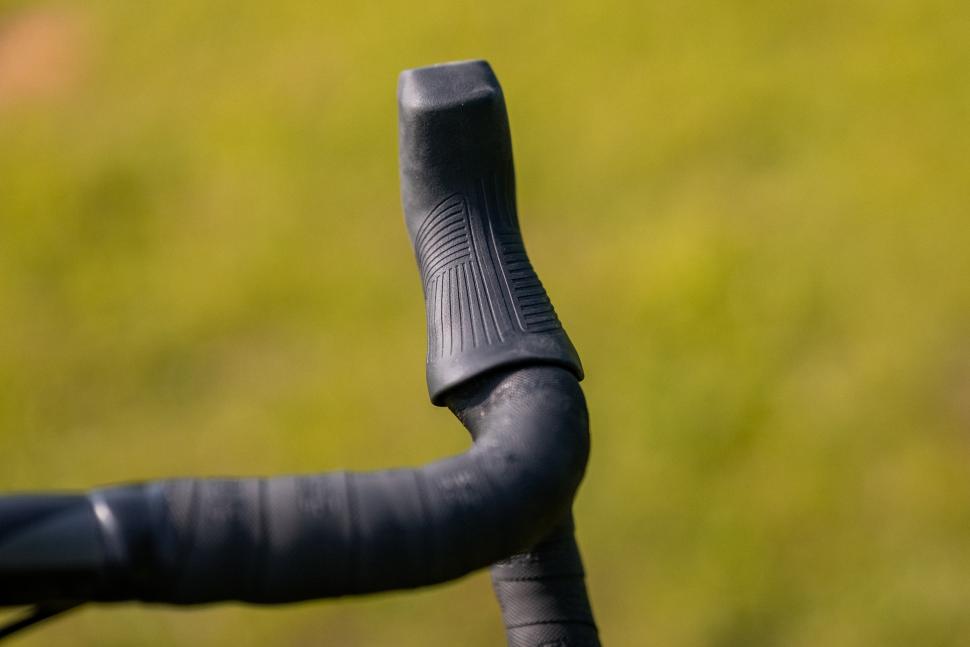
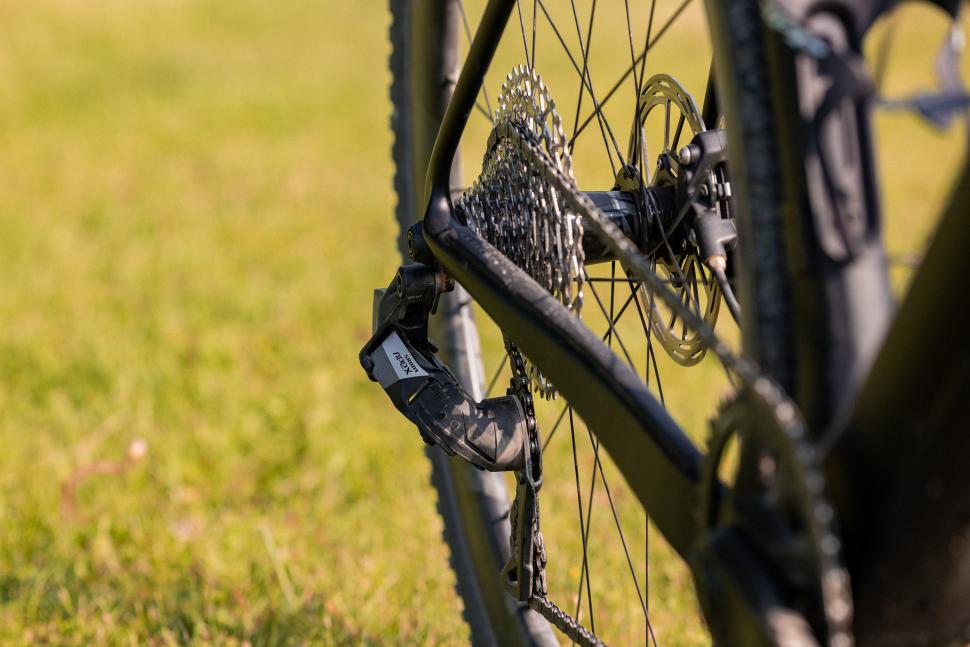
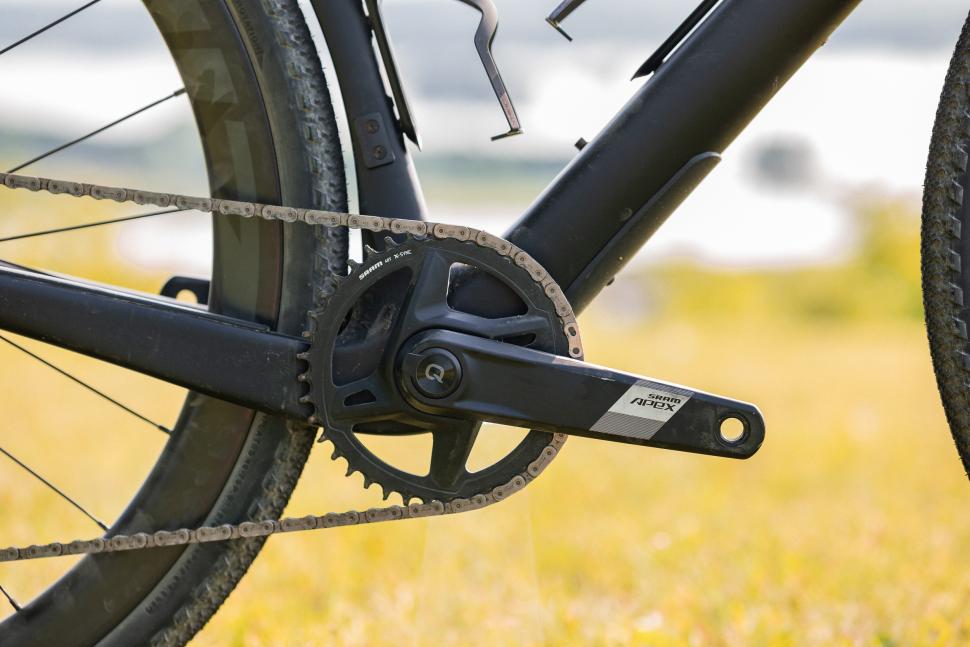
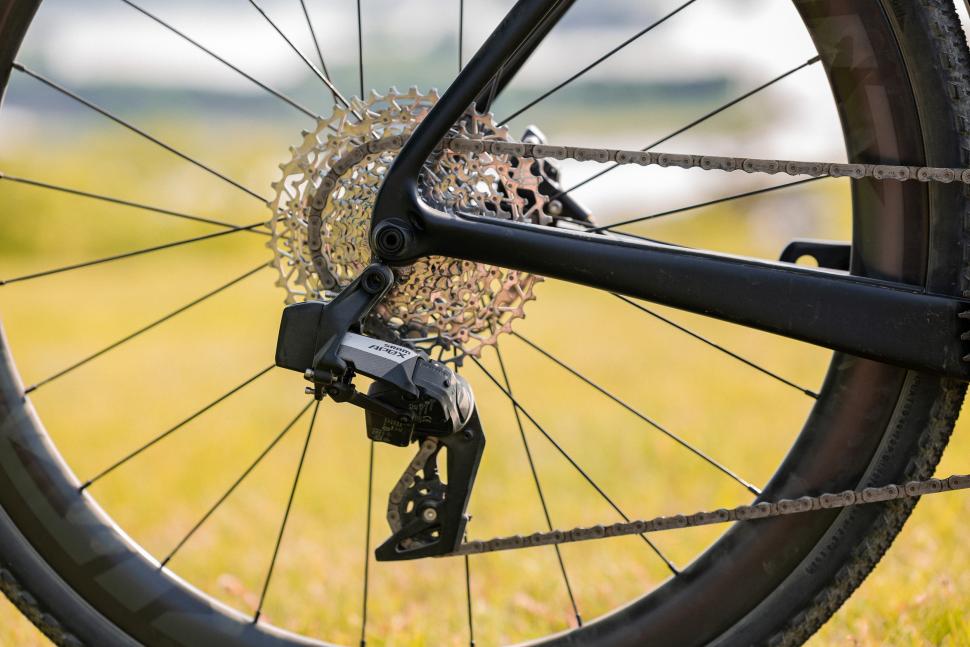
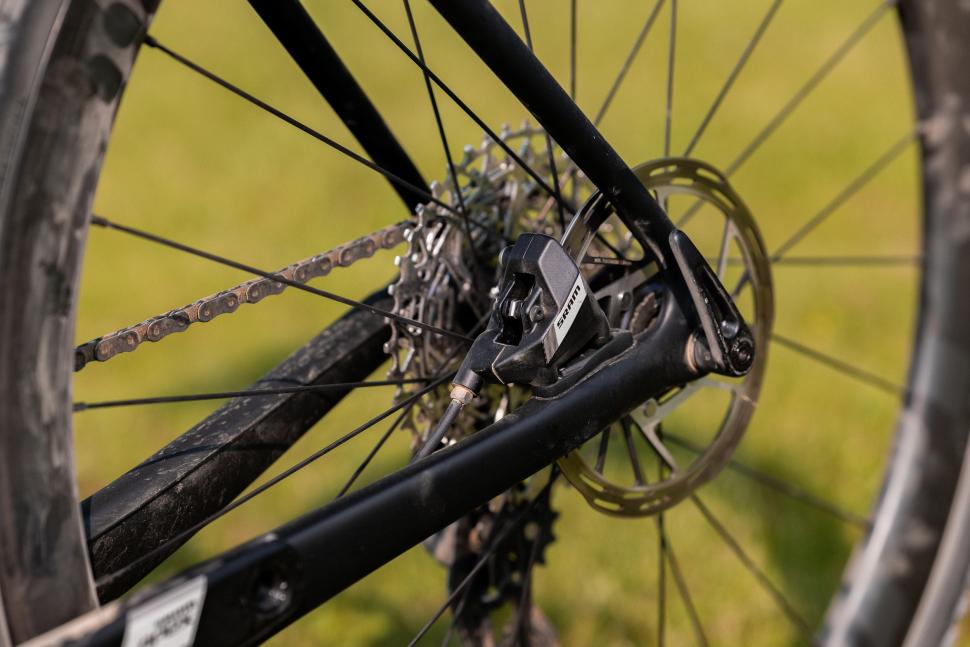
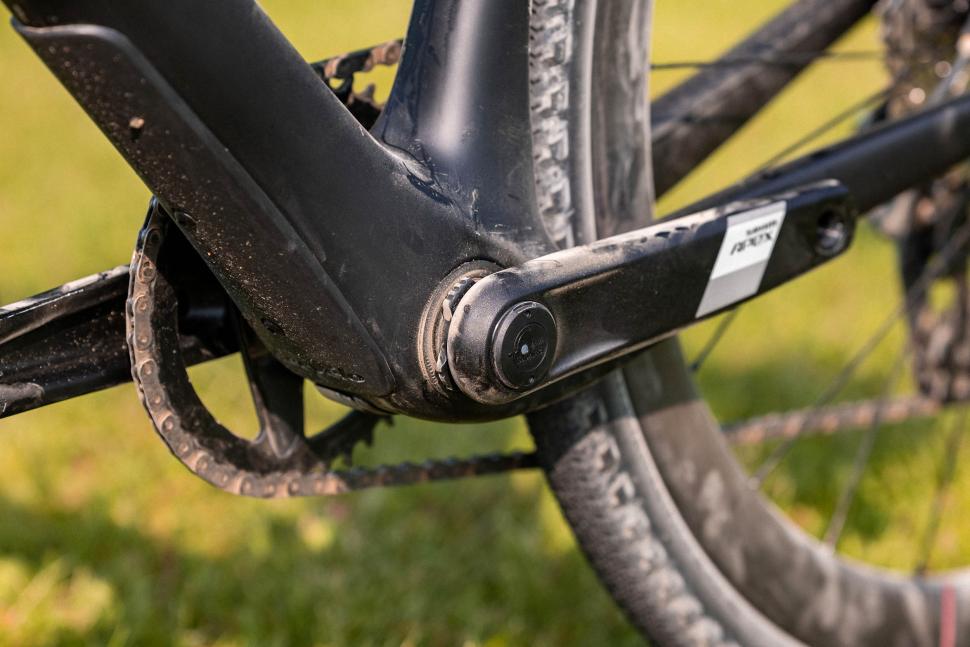
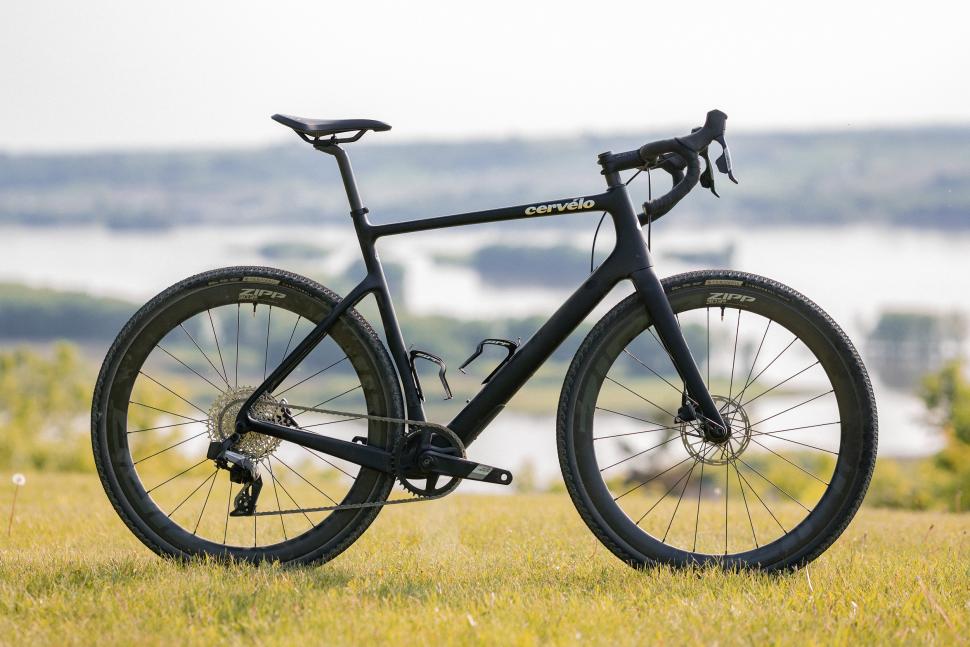
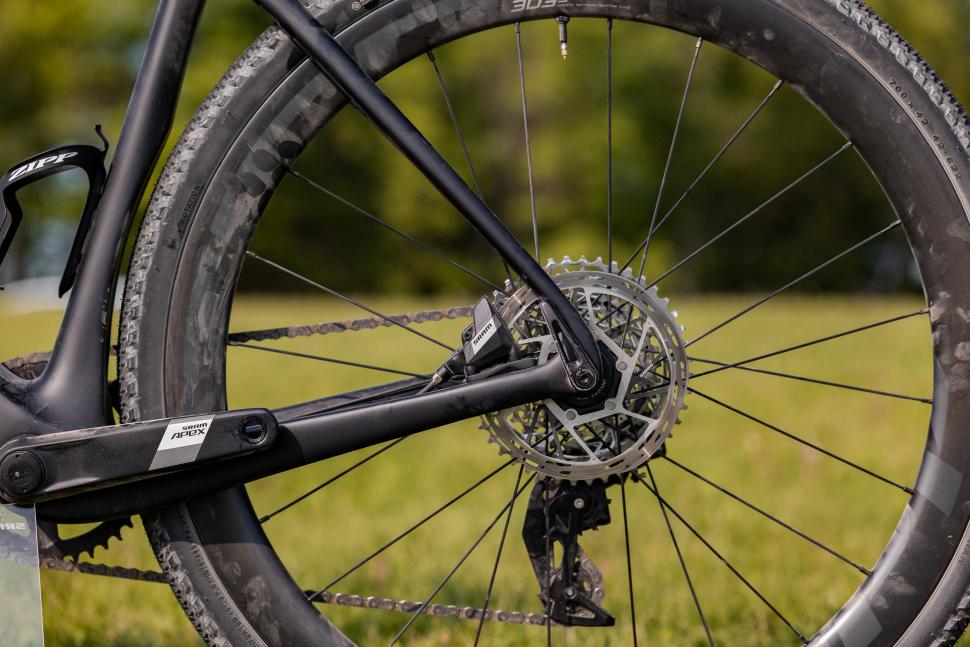
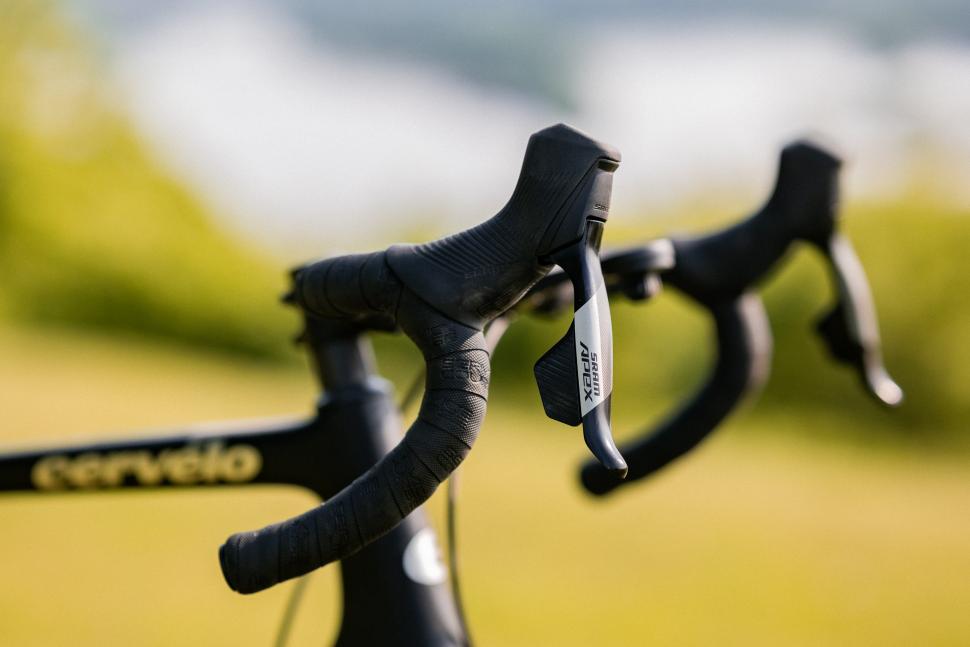
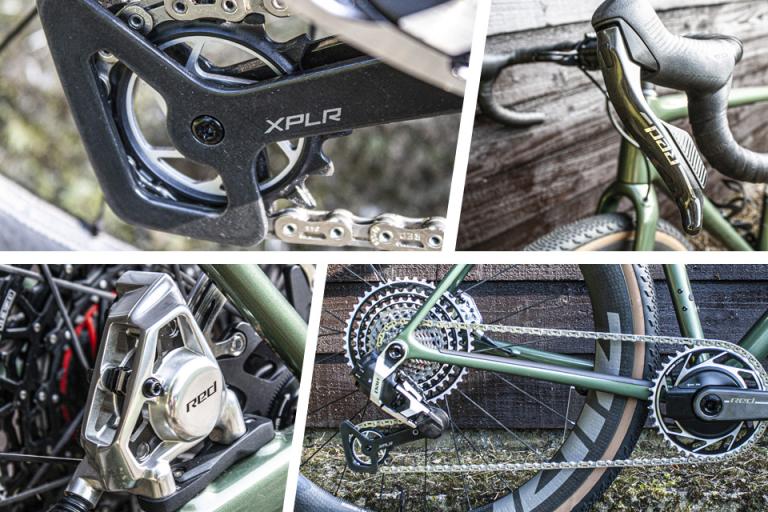

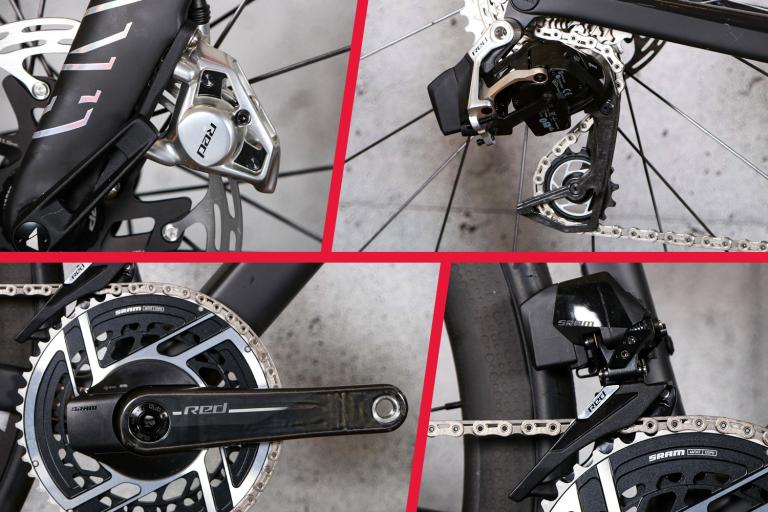
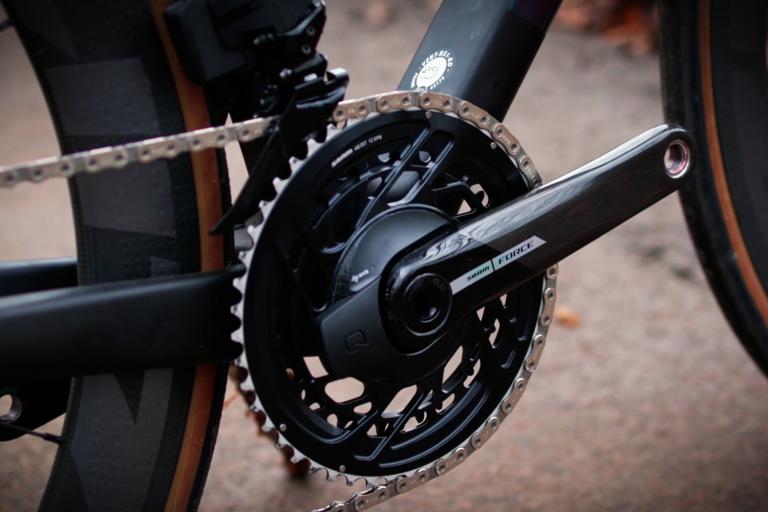
Add new comment
11 comments
£1,200+ is now "affordable", and "entry level" is it? Dear God, the world's gone mad, along with the reviewers.
Fully agree to this comment, many readers are riding whole bikes that cost under the price of this groupset. Suggest Aaron climbs down from the ivory tower of cycling journalism and takes a reality check on what the "average" UK cyclist sees as an affordable price, suspect it's closer to that of mid range mechanical like 105 @ reasonable £500, possibly 105 - R7170 DI2 or SRAM Force etap axs at a big stretch at £869 and £934. £1200+ doesn't strike me as particularly affordable.
Well aware this is comparing apples with wellington boots, but 10 years ago I got SRAM Force for not much more than this. And it came with a Canyon attached.
It is dishonest marketing. I mean you can get an Archer D1X system for less.
I have just fitted some SRAM Level brakes to my MTB and these did not have the bleeding edge technology either. If these are like what I've just bled, then its a whole lot messier and harder than bleeding shimano brakes. Would never buy SRAM brakes that didn't have bleeding edge.
"there isn't a better entry-level electronic groupset currently available" - maybe a proviso should be added that this only applies if you can tolerate having only 1 chainring, because that wouldn't be the case for me at any price level.
I was thinking same.
"There are three cassette options: 11-44T, 10-44T or 10-36T, each of which will fit a traditional 11-speed HG-style driver body."
Only the 11-44 is HG, the other two are XDR.
Is this one of those sticker prices that is far more than you will end up paying? You can get something like 105 di2 for about £900 which comes with double chainring up front so I would assume a 1x to be a little cheaper.
Having followed various gravellists running this group set I noticed the following. 1 it is far from crisp in the gear change 2 It sounds awful like a bag of metal bones being chewed by a metal dog. 3 it drops the chain. Quite a lot. Not sure how much the writer has been sponsored for this article. It is cheap and arguably good value.
Or the people you follow don't know how to setup their derailleur.
Shifting is fine and it won't drop the chain if it's the correct length. If it's too long it probably will sound like crap and drop.